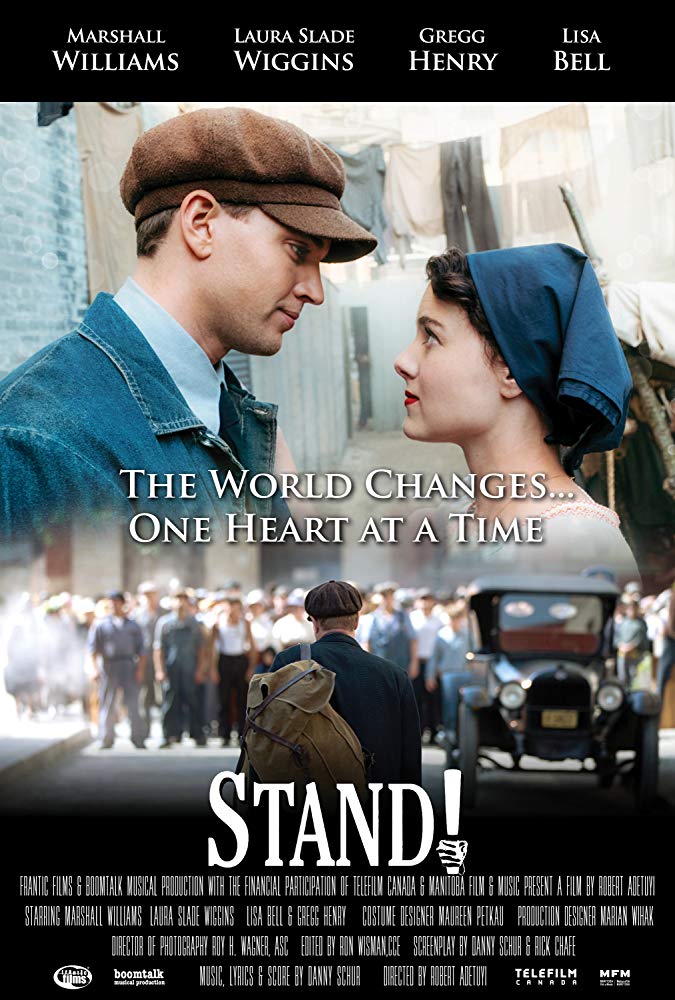Stand! (2019)
Director: Robert Adetuyi
Writers: Rick Chafe, Danny Schur
Reviewed by Stephen Seaborn
Stand!, the feature length drama about the 1919 Winnipeg General Strike, charmed audiences with its world première at this month’s Toronto International Film Festival. It is beautifully shot and cleverly scripted, with a tender romance central to its storyline.
The film’s producers clearly understood the addition of romance to be essential for a historical fiction designed to reach a broad, and perhaps jaded, 21st century audience. However, Stand! will likely not thrill students of labour history or union activists hoping to learn more about what went down in Winnipeg 100 years ago. Not to be a Donnie Downer but we’re left wondering about the details – What was the actual nature of workers’ engagement with this act of defiance?
The portrayal of a totally unified workforce over 30 days in Winnipeg is surely a glorification of the strike. Were there, for example, no class collaborators who succumbed to Winnipeg’s Titans of Industry? The storyline suggests not, except for that one hardline fellow who, late in the film, is revealed to be one of those scumbag class-traitor types in the pay of the employers’ committee.
Perhaps such historical details are contained in scenes lying on the cutting room floor, but not likely. I’m pretty certain such scenes were never shot.
This is likely because Stand!, the movie, is an on-screen adaptation of Stand!, the stage musical. So, drama? Yes. Plotline? Certainly. But soon it’s time for the dialog to morph into the next song, so details get dropped.
A lingering downside of the film (and, I presume, its predecessor stage production in Winnipeg) is how poorly the Bolsheviks are depicted. The father of the young, romance-rattled machinist is seriously bitter about his life in Ukraine, where the Bolsheviks tormented him and eventually killed his wife and kids.
And as the film proceeds this character remains the sole holdout in the illegal walkout. He becomes the one and only scab after all the machinists walk off the job.
Soon after, in a not too surprising development, we see Daddy scowling at the strikers as wave after wave of garment workers, labourers, spouses and families stream by him. Yet somehow, the lovelorn son swiftly coaxes the father to abandon his scabbing and join the strikers, who are just then striding purposely along with Winnipeg’s streets.
Really?

To be fair, both the writer of the screenplay and the playwright of the original musical production of Stand! tell us the Winnipeg General Strike was an incredible act of resistance which shouldn’t slip by unnoticed. They both, along with the Manitoba Arts Council and Winnipeg’s city council went out on a limb to bring this project to fruition. In the Q&A following the TIFF screening, the screenplay writer described the 30-day strike as “the most important event, after the Russian revolution, in the last 100 years.”
Stand! has already been picked up by teachers’ unions for classroom use. Cineplex has signed on for Canada-wide distribution, and negotiations with US and international distributors are underway.
Making working class history accessible to a broad contemporary audience is a tall order. But ignoring the nuances of our history surely weakens any film’s credibility. Stand! is charming and worth seeing when it comes to your area. But it is a missed opportunity.




